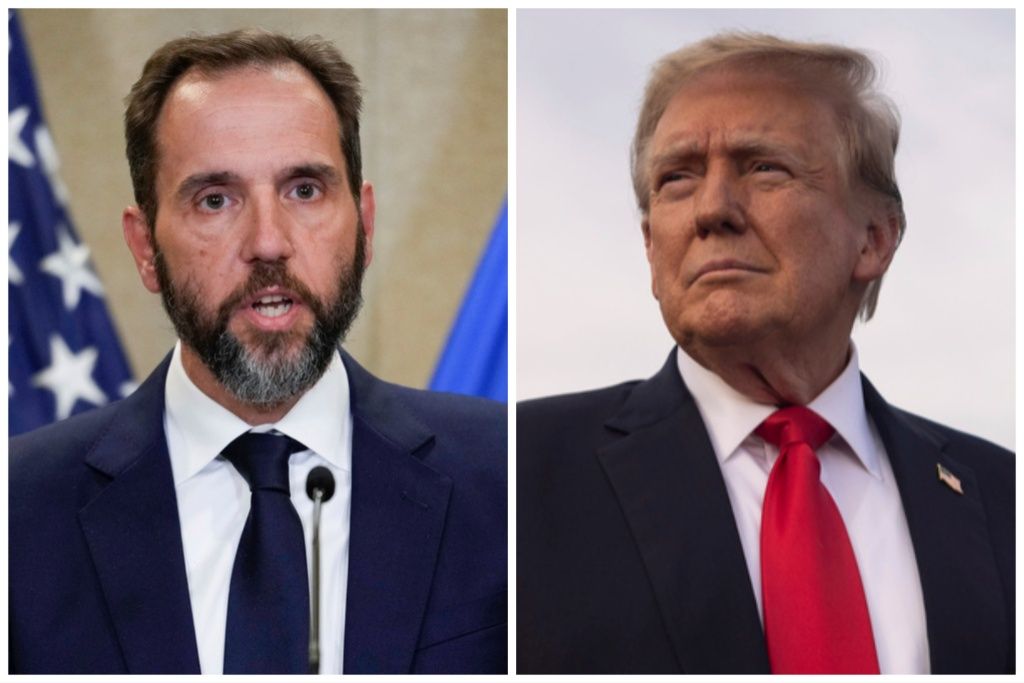

Former President Donald Trump‘s lawyers are seeking sanctions against special counsel Jack Smith and his office for the request to limit what Trump could say about law enforcement agents involved in his Florida classified documents case.
Trump’s lawyers filed a motion on Monday asking U.S. District Judge Aileen Cannon, who is presiding over the case, to strike Smith’s request, make civil contempt findings for all attorneys in the government who were involved with the decision, and impose sanctions following an “evidentiary hearing” into Smith’s office’s decision to “disregard required procedures.”
Federal prosecutors on Friday asked Cannon to revise the conditions of Trump’s release to prohibit him from making public comments that could “pose a significant, imminent, and foreseeable danger to law enforcement agents.”
Trump’s team is arguing Smith’s motion “improperly asks the Court to impose an unconstitutional gag order on President Trump,” which was “based on vague and unsupported assertions about threats to law enforcement personnel whose names have been redacted from public filings.”
Smith’s office filed the request in response to a claim Trump made last week regarding the FBI agents who searched his home in August 2022, stating they were “authorized to shoot me” and were “locked & loaded ready to take me out & put my family in danger.”
During the search, the FBI followed a standard use-of-force policy that prohibits the use of deadly force except when the officer has a reasonable belief that the subject being searched has an intent to harm the officer or another person.
“The Government’s request is necessary because of several intentionally false and inflammatory statements recently made by Trump that distort the circumstances under which the Federal Bureau of Investigation planned and executed the search warrant at Mar-a-Lago,” prosecutors on Smith’s team said when asking Cannon to restrict Trump’s language regarding law enforcement agents.
Trump’s motion said Smith’s request was based on “unsupported assertions about threats to law enforcement personnel” and that their names have already been redacted from public filings.
Trump’s team said the petition was “unprecedented.”
“The Motion is an extraordinary, unprecedented, and unconstitutional censorship application,” the filing said. “The Motion unjustly targets President Trump’s campaign speech while he is the leading candidate for the presidency.”
Trump’s team also took issue with the special counsel’s timing of the request. They said the motion was filed Friday evening at 5:30 p.m. ahead of the Memorial Day weekend holiday, to which Trump’s team responded within 10 minutes.
“We noted the suspicious timing of the communication,” the filing said. Trump’s team said they offered to meet Monday evening, to which the special counsel called a conferral a “fruitless exercise.”
The filing also outlined additional timing concerns with Trump’s criminal hush money trial in New York that they said the special counsel was aware of.
“Under no circumstances can an email exchange initiated at 5:30 p.m. on a Friday evening constitute the type of conferral required by Local Rule 88.9,” The filing said. “For President Trump, the fact that the Special Counsel’s Office initiated the exchange on the Friday preceding a holiday weekend is less important than the fact that the Office—well aware of the proceedings in People v. Trump— took these steps when President Trump’s defense summation is scheduled to begin on the morning of May 28.”
CLICK HERE TO READ MORE FROM THE WASHINGTON EXAMINER
Trump’s team additionally claimed there has been a “disregard of procedural rules” by Smith’s team, including the timing of the request, and some prosecutors on the special counsel “pander[ing] to the media in public filings.”
In the motion, Trump’s lawyers also asked Cannon to hold a hearing to determine Smith’s “motives and purpose” in making the request “when they did.”
The Washington Examiner reached out to Smith’s office for comment.






